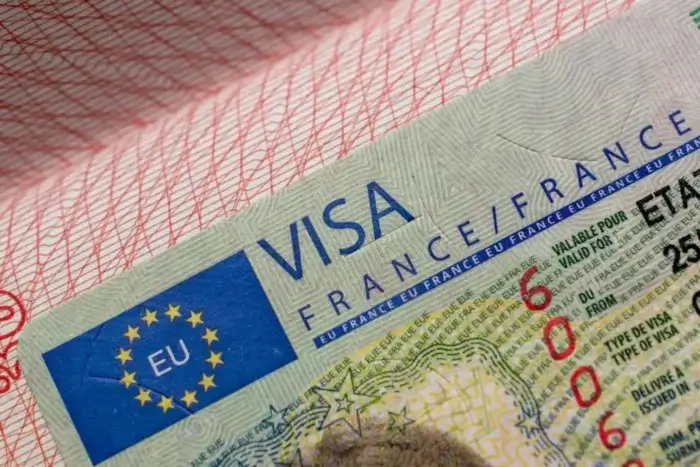
.svg)
France is one of Europe’s leading destinations for international talent, welcoming tens of thousands of foreign workers and professionals each year. For employers, hiring from this global talent pool comes with significant responsibility. French employers must navigate complex immigration compliance requirements, which have become increasingly strict following recent legislative changes. Failure to comply can result in serious financial, legal, and reputational consequences.
Whether you’re hiring your first international employee or managing a global workforce, understanding these obligations protects your business while providing access to world-class talent. This article provides French employers with a step-by-step compliance checklist, covering everything from pre-hire requirements to ongoing status monitoring.
{{tip-component-1}}
Overview of French Employers’ Legal Obligations
French immigration law places extra duties on employers when hiring non-EU workers. These obligations begin before a job offer is extended and apply throughout an employee’s tenure in France. Key employer responsibilities include:
- Conducting labor market testing where required — unless the role is on the official shortage occupations list (“métiers en tension”), which exempts it from this step until at least the end of 2026
- Obtaining all necessary work permits and authorizations before employment begins
- Verifying and regularly confirming each foreign employee’s right to work in France
- Maintaining detailed records and documentation as required by French labor law and immigration authorities
- Monitoring and ensuring the timely renewal of work permits and residence authorizations
Legal requirements and processes may differ based on the relevant permit category, making compliance more complex for employers managing multiple foreign worker types.
Pre-Hire Requirements for Employers
Before hiring any non-EU worker, French employers must comply with labor market rules that vary depending on the permit category and position.
Labor Market Testing
Most standard employment-based work permits require a labor market test to prove that no qualified candidate already within France or the EU is available for the role. This involves:
- Advertising the position with France Travail (formerly Pôle emploi) for at least three consecutive weeks within the six months before submitting the work authorization application
- Documenting all applications received and providing a clear justification for the rejection of local or EU candidates
- Offering a salary that meets at least the French legal minimum wage — Salaire Minimum Interprofessionnel de Croissance (SMIC), which is currently €21,203 annually, although some permit types have higher requirements
- Maintaining all documentation as supporting evidence for permit applications and possible labor inspections
{{tip-component-2}}
Employment Contract Requirements
Employment contracts for foreign workers must meet both standard French labor law (Code du travail) and specific immigration requirements.
Required contract elements include:
- Explicit mention of the work permit category and role to ensure it aligns with the permit application.
- A specified employment duration that generally exceeds three months for most permits, with fixed-term contracts — Contrat à Durée Déterminée (CDD) — or open-ended contracts — Contrat à Durée Indéterminée (CDI) — both accepted depending on role and permit.
- A detailed job description that precisely matches the functions listed in the work permit application.
- Salary information demonstrating compliance with at least the legal minimum for the permit type: €21,203 (SMIC) for standard employees, €35,891 for Passeport Talent, and €53,836.50 for the EU Blue Card, with higher or different thresholds for certain subcategories.
- A signed written job offer or contract submitted as part of the application documentation.
For Passeport Talent permits, the contract must meet the relevant gross annual compensation floor set for each subcategory (e.g., €35,891 for “Qualified Employees”). ICT permits require proof of prior employment with the parent/affiliate company for at least three months — and sometimes longer — before the transfer.
Work Permit Categories in France

France provides several work permits for non-EU employees, each with specific eligibility and compliance requirements for employers.
Passeport Talent: The Premium Route for Skilled Workers
The Passeport Talent (Talent Passport) scheme targets highly skilled talent through multiple subcategories, such as:
- Qualified employees
- EU Blue Card holders
- Researchers
- Entrepreneurs
- Employees of innovative companies
Each category features distinct eligibility criteria.
Key advantages
- No labor market test
- Up to four years’ validity, renewable
- Streamlined application via one authority
- Family reunification rights
- Ability to change employers within the category
Requirements
- Salary threshold varies: €35,891 (Qualified Employee), €53,836.50 (EU Blue Card), with higher or lower thresholds for specific roles.
- Detailed job description matching permit application
- Employment continuity throughout permit validity
- Current supporting documents for renewals
Salarié détaché: Intra-Company Transfer (ICT)
The Salarié détaché (ICT) permit allows multinational companies to transfer managerial, specialist, or trainee staff to France.
Requirements
- Minimum of three months’ prior group employment
- Assignments must be managerial, specialist, or trainee
- Salary must be at least 1.8 × French minimum wage (around €39,593 in 2025)
- Detailed proof of prior employment and business justification
Employer Duties
- Document the employment relationship and business need
- Maintain role and responsibility records
- Coordinate documentation with foreign offices
Seasonal Work Permits
Seasonal worker permits support short-term labor needs in approved sectors such as agriculture and tourism.
Requirements
- Up to six months’ work in any twelve-month period
- Limited to designated activities and locations
- Proof of appropriate accommodation is required
Employer Obligations
- Arrange suitable housing and record compliance
- Observe industry-specific labor rules
- Organize return travel
- Keep detailed work and pay records
All work permit categories come with detailed compliance, documentation, and renewal obligations for employers.
Employer Declarations and Documentation

Successful French work permit applications rely on meticulous documentation, timely electronic filing via the official portal, and careful coordination with local authorities.
DREETS and Préfecture Filing Requirements
The application process is managed online, with the Directions régionales de l’économie, de l’emploi, du travail et des solidarités (DREETS) handling work permit review and the préfecture addressing residence permits.
Required documents
- A fully executed employment contract that meets immigration and labor code requirements
- Proof of labor market testing, if relevant to the permit category
- Up-to-date company registration and good standing
- A detailed job and qualifications description
- Financial documentation demonstrating ability to pay statutory wages
Additional considerations
- Applications should be filed well before the intended start date (at least three months in advance), ensuring all documents are recent and anticipating requests for further information.
- Employers must coordinate with prospective hires on parallel visa/residence permit steps.
- Before starting employment, employers must file a Declaration Prior to Hiring (DPAE) with Unions de Recouvrement des Cotisations de Sécurité Sociale et d’Allocations Familiales (URSSAF) at least 8 days in advance.
Record-Keeping Requirements
French law mandates comprehensive document retention through the employment period and for at least five years post-termination. Employers must keep:
- Original, signed employment contracts and amendments
- Copies of all permits and supporting application materials
- Labor market testing evidence, where applicable
- Official correspondence with authorities
- Payroll and wage evidence
Best practices include maintaining secure, redundant digital and physical records, routine training of HR staff, and ensuring instant access for potential audits or inspections.
Right-to-Work Verification in France
By law, French employers must confirm that all employees are authorized to work before hiring. This obligation includes several steps, particularly for non-EU/EEA/Swiss nationals:
- Request and inspect original residence permits and work authorization documents from the candidate.
- If the employee is not registered as a jobseeker with France Travail, submit a verification request to the local prefecture at least two working days before the employee’s start date.
- Document the verification procedure and record any feedback or non-response from the prefecture.
- Maintain copies of all authorization documents in each personnel file.
Timeline considerations
- Verification must be done before employment starts and repeated at every permit renewal.
- No prefecture response within two working days is considered legal completion of the employer’s duty.
- Verification is not needed for individuals registered as jobseekers with France Travail.
- Temporary receipts (récépissés) and renewal certificates may allow work if explicitly stated.
Meticulous documentation of each verification step is required for compliance with French labor and immigration law.
Renewals and Status Monitoring
Employer responsibilities in France continue after initial hire, requiring proactive permit renewal and ongoing status monitoring to prevent compliance lapses that could incur penalties.
Ongoing Obligations
- Systematically track expiring permits and set up formal reminder systems.
- Advise employees to initiate renewals well before expiry (recommended 2–4 months in advance).
- Collect updated authorization documents from employees immediately upon renewal and re-verify their right to work.
- Re-verify work eligibility if employment contracts or roles change, and keep all documentation current and accessible for audits.
- Submit updates to authorities as required for any changes, such as status shifts or contract amendments.
Renewal Timeline Management
Most permits require renewal through the ANEF portal at least two months before expiration, making early planning critical given the potential for delays or agency backlogs. Processing times and approval outcomes can also vary depending on shifting legal criteria or individual circumstances, which adds another layer of complexity.
During the renewal process, employees may face restrictions on international travel, underscoring the importance of careful preparation and communication between employers and employees.
Best practices
- Begin renewal coordination at least 90 days before permit expiration
- Assist employees with document collection
- Provide updated employment confirmations or contracts as needed
- Proactively monitor progress and respond to additional authority requests.
Supporting Employee Status Changes
When an employee requires a change in permit status — due to promotion, salary increase, business restructuring, or a move toward permanent residence — the employer must coordinate and submit the appropriate new application or change of status request before the change occurs.
Recommended Monitoring Systems
- Use automated tools to track expirations and send alerts
- Hold routine check-ins with employees about permit status
- Establish escalation protocols for renewal delays or non-compliance risks
- Maintain contingency plans for any authorization gaps.
{{tip-component-3}}
Penalties for Non-Compliance

Non-compliance with France’s immigration laws exposes employers to severe administrative, financial, and criminal penalties, with recent reforms significantly intensifying enforcement.
Financial Penalties and Administrative Fines
The 2024 Immigration Act sets clear fines:
- First violation: Up to €20,750 per unauthorized worker (5,000 times the hourly minimum wage).
- Repeat violations: Up to €62,250 per unauthorized worker (15,000 times the hourly minimum wage).
- Additional fines apply for failure to verify work authorization or when contracting for services without proper checks on suppliers’ compliance.
- Companies engaging subcontractors or external entities are jointly liable for unauthorized workers in their supply chain.
Factors affecting penalties include:
- Number and duration of unauthorized workers employed
- Compliance history and level of cooperation
- Financial capacity of the employer
- Degree of intentionality or negligence.
Criminal Liability
Serious or repeated infractions can trigger criminal prosecution:
- Fines up to €30,000 per unauthorized worker
- Up to five years’ imprisonment for repeat or group offenses
- €200,000 criminal fine if offenses are committed by an organized group.
- Company directors and managers may be held personally liable, impacting professional licensing and future business prospects.
Aggravating circumstances include the use of multiple unauthorized workers, exploitative employment conditions, and efforts to hide violations.
Building a Robust Compliance Program
Robust immigration compliance in France relies on documented internal policies, regular staff training, and technology-driven controls to monitor legal obligations and prevent costly violations.
Developing Internal Procedures
Effective internal policies should cover:
- Procedures for labor market testing (only as required by law) and full documentation of recruitment steps.
- Detailed, step-by-step guides for permit applications and renewals with assigned responsibilities and timelines.
- Protocols for right-to-work verification, specifying timing and documentation for each step.
- Record-keeping rules, including minimum statutory retention schedules and secure storage requirements.
- Clear escalation paths for addressing compliance issues or receiving updates on legal changes.
Training and Education
Consistent training helps ensure legal adherence:
- All HR personnel and hiring managers should receive initial and ongoing compliance training.
- Provide timely updates and scenario-based guidance as laws evolve or government guidance changes.
- Keep records of all training for audit support and internal review.
Technology Solutions and Automation
Modern systems streamline compliance:
- Use digital platforms to automate reminders for permit expirations, renewals, and status checks.
- Employ document management systems with secure, redundant backup for permits and supporting evidence.
- Integrate HR/payroll systems to monitor wage thresholds required by each permit type and flag issues.
- Leverage reporting and analytics tools to support real-time compliance reviews and facilitate external audits.
These components work together to ensure reliable, proactive compliance — even as laws and enforcement practices evolve.
Bottom Line
For French employers, immigration compliance is more than a legal requirement; it’s a safeguard for business continuity and reputation. By following this checklist, companies can reduce risk and confidently hire international talent.
{{cta-component-center-aligned}}
- Hiring non-EU workers requires careful compliance with French immigration and labor rules; violations carry heavy financial and legal consequences.
- Employers must verify work eligibility, secure the correct permits, keep detailed records, and proactively manage renewals.
- Rules vary by permit category; Passeport Talent, ICT, and Seasonal permits have specific salary thresholds, documentation requirements, and timelines.
- Building a compliance program with clear procedures, HR training, and digital monitoring tools can help employers grow their businesses while avoiding costly penalties.
- Roles on the regional shortage occupation list, which are exempt through at least December 2026
- Passeport Talent categories for highly qualified workers
- Recent graduates in certain qualifying positionsIntra-company transfers under defined criteriaSeasonal work in designated sectors
Many employers implement internal compliance calendars to avoid lapses in status.
.png)
.png)
.png)










.svg)
.avif)